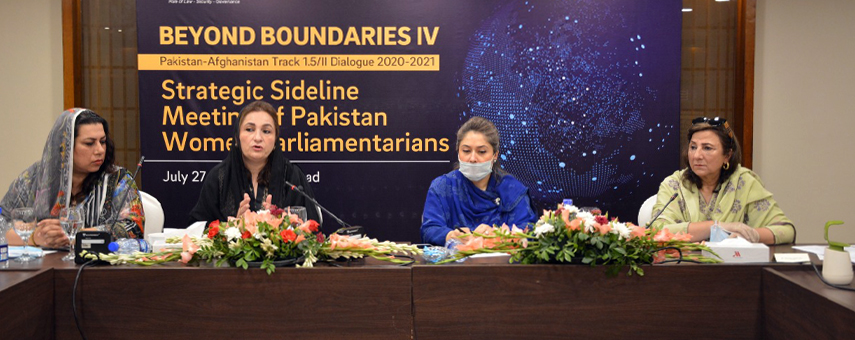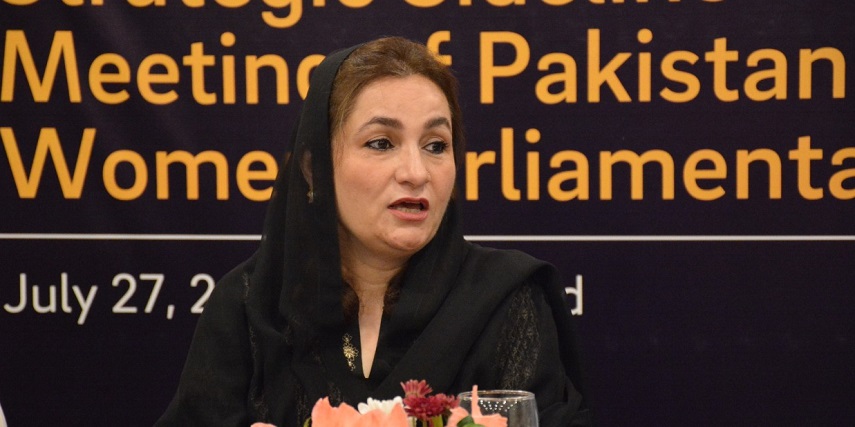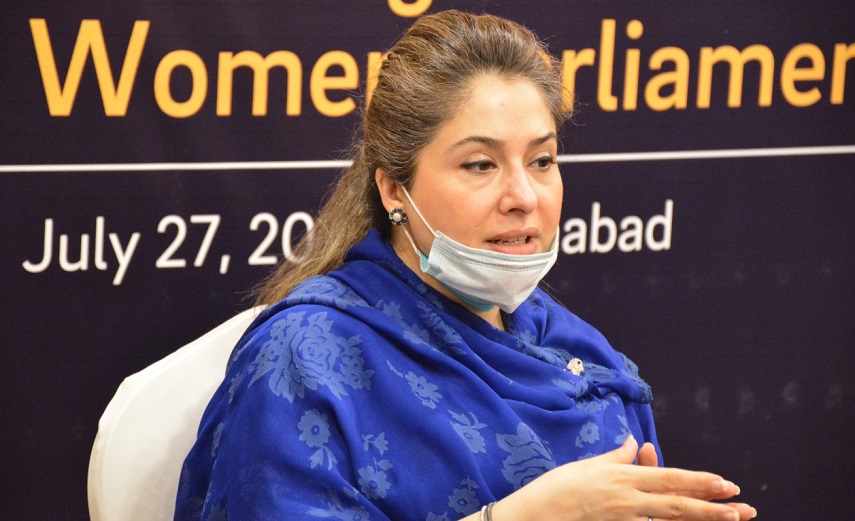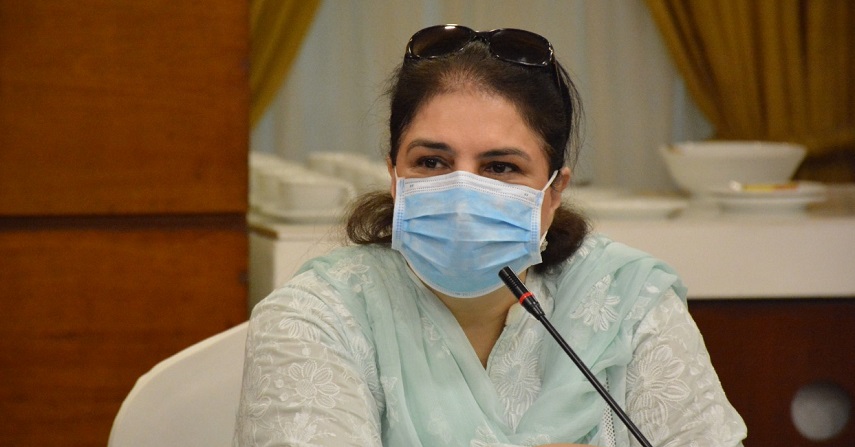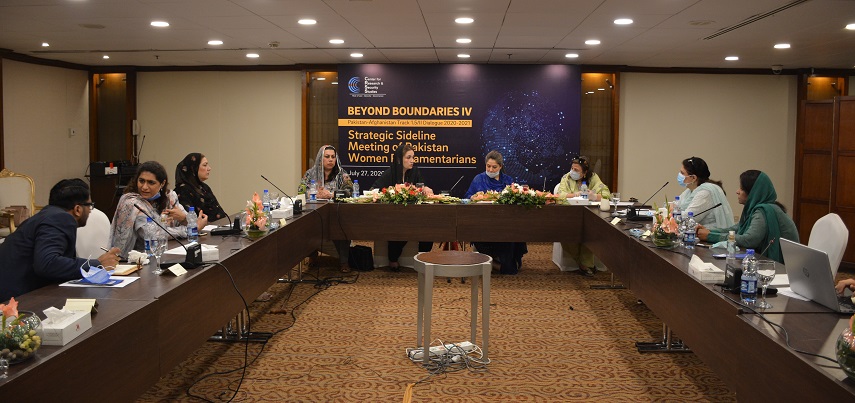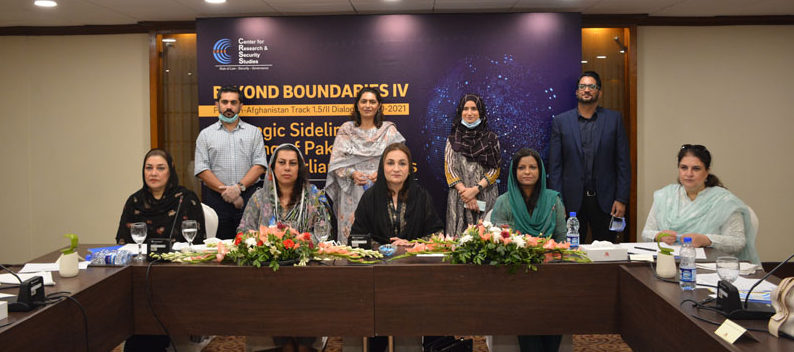With the goal of creating a Pakistan-Afghanistan women-led parliamentary caucus to work on bilateral issues of import, CRSS convened a strategic sideline meeting of Pakistani women parliamentarians in Islamabad on July 27. A similar meeting of Afghan women parliamentarians was held virtually on July 25, 2020. This endeavor is part of CRSS’ efforts to improve Pakistan-Afghanistan bilateral relations under its ongoing Track 1.5/II Beyond Boundaries (BB) initiative.
The bilateral caucus was a recurrent recommendation in BB’s recent women-led conferences where delegates stressed on instituting a formal mechanism to work on raising the issues faced by women on both sides of the border, complete with solutions and relevant policy recommendations. Most recently, this need was reiterated by female Member of National Assembly (MNA) Mehnaz Akber Aziz and Member Afghan Parliament Ms. Shinkai Karokhail during a virtual women-led conference organized by CRSS (in partnership with OESP) on June 15, 2020.
Besides MNA Aziz from Pakistan Muslim League Nawaz (PMLN), attendees of the moot included female Senator Rubina Khalid from Pakistan People’s Party (PPP), female MNAs Nafisa Shah (PPP), and other females from the ruling Pakistan Tehrik-e-Insaaf (PTI) party MNA Shaheen Saifullah, MNA Shandana Gulzar, MNA Uzma Riaz Jadoon, and MNA Zille Huma. CRSS was represented by member of CRSS’ advisory board Sameena Imtiaz; BB’s project lead Zeeshan Salahuddin, BB Economic Connectivity (EC) Program Manager Junaid Raja, Program Manager for Afghan Studies Center (ASC), Sitwat Waqar Bokhari, and BB’s M&E specialist Mustafa Malik.
As an initial sideline meeting, discussion between the members of parliament focused on the objectives, vision, and scope of the proposed bilateral caucus.
In her opening speech, MNA Aziz, who had also been a consistent core member of CRSS’ bilateral dialogues of Pakistan-Afghanistan Joint Committee (PAJC), stated that while the initiative should be a women-led group, albeit with the possible inclusion of male parliamentarians to offer support to policies raised by women through this caucus. Terming women as true bridge-builders and peace makers, she stressed on the need to promote women in power sharing through this effort. Highlighting the struggles and active role played by women in Afghanistan, she said that the Afghan women have been the front-line leaders already, though their efforts towards achieving their rights and freedom need to be more institutionalized. She also stressed that there is a need to strike some gender balance in the Afghan peace process which is currently completely male-dominated, whereas war affects women disproportionately.
MNA Aziz also noted that young women in Afghanistan, either due to international funding or an internal maneuvering, had been assuming positions of power in the government, which was a great achievement for the country. Speaking on the fear factor raised by the Taliban, she stated that it is yet to be seen how the Taliban would treat women that wish to remain in power after the intra-Afghan peace talks conclude. Regarding the caucus, she stated that the forum can be used to promote cultural, student, and parliamentary exchanges, in addition to other suggestions shared by fellow members, which would pave the way for reducing the mistrust that had piled up between the people of Pakistan and Afghanistan. She also shared that she had written a similar request for a caucus to Foreign Minister of Pakistan Shah Mahmood Qureshi, as she strongly felt that collaborating in such activities and working jointly towards development would greatly aid in settling bilateral tensions. She concluded by envisioning a larger regional coalition of women leaders from Muslim countries that could come together and lead forums raising women’s perspectives on regional matters.
MNA Gulzar, who is also currently the chairperson for Commonwealth Women Parliamentarians (CWP), proposed working jointly with Afghan women leaders in the domains of commerce, security, visas, agriculture, health, education, employment, COVID-19 efforts, border trade, refugees, maternal health, youth engagement, and provision of services, particularly medical, in the border areas. Regarding youth engagement from both sides, she stated that there are around 104 parliamentarians in Pakistan’s National Assembly that fall in the category of the youth. She then stressed on narrowing down four to five solid goals that the members of the caucus could work towards and deliver tangible outcomes on before the next elections. Introducing the other members present, Ms. Gulzar stated that all were doers and well-recognized for their individual efforts.
Giving her own example as the Chairperson CWP, she stated that she could work on commonwealth training for Afghan women parliamentarians. She further proposed that at the outset, the agenda could focus on working towards the achievement of Sustainable Development Goals (SDGs), not just for the women of Pakistan but also Afghanistan. She stressed in particular on women’s economic emancipation and their financial inclusivity which would ultimately aid in introducing and keeping women in positions of power in the different sectors. Regarding including men in the caucus, she proposed that male parliamentarians can become part of the process further down the line, so the women-led ownership is established. She proposed to hold a tactical meeting at the Secretariat of SDGs at the Parliament after Eid-ul-Adha when the National Assembly session resumes.
Speaking on her experience with Afghan people, Senator Khalid noted that the Afghans are a very enterprising people that Pakistan can learn a lot from and vice versa. She stressed on the need to interact with the Afghan women who she stated she had always found to be very outspoken and to the point due to the struggles that they have been through under the Taliban rule.
Recalling the previous efforts by the Pak-Afghan parliamentary caucus in the National Assembly as its first secretary since 2008, MNA Shah stated that the caucus, whose activities are significantly dormant now, was a positive process initiated at a time of terrorism at the peak in both countries, which kept peace-building at the center of the agenda. As Afghanistan continues to be struck with conflict, she proposed that along with talking about women’s rights, cultural promotion, and scholarships for students, peace-building should be integrated as a consistent point of agenda. Speaking about the effects of war on even the educational curriculum taught in schools, Ms. Shah stated that violence, conflict, how women are affected by it, and how they can help solve these issues should be part of the discussions on such a forum between women leaders.
She proposed that the proposed bilateral caucus group could learn from the lessons and carry on some of the work already initiated under the previous caucus by including a few members who were part of that caucus. She also proposed that there should be representation from all parties and groups in such a caucus while the National Assembly and the Senate should both be taken on board for their support and expertise. Ultimately, this can become a larger bilateral forum which would have more outreach and impact for policy making on both sides. She concluded by saying that the common agenda would be finalized after meeting with the Afghan women parliamentarians. She also stressed on carrying out parliamentary exchange visits between the two countries to carry on this process.
MNA Saifullah proposed that collaborations with Afghanistan could even include domains such as offering educational support to special children, given her experience setting a school for differently abled children in Mardan, Khyber Pukhtunkhwa (KP) province.
MNA Jadoon shared that she had observed there to be a high degree of Indian influence in Afghanistan which had significantly marred the image of Pakistan in the minds of the Afghan people. She stressed that the Government of Pakistan (GoP) needs to introduce policies that change the perspective of the Afghan people towards Pakistan. She hoped that through this forum better policies for women on both sides will be devised that will realize that objective.
MNA Huma shed light on her 23-year long struggle to empower women in Balochistan where through her training, 8,000 women gained useful skills. Many of these, she stated, were Afghan women who utilized these skills to carve out job opportunities for themselves. She stated that there is a lot that Pakistan can learn from the Afghan culture. She said that she was pleased to be part of this forum, along with all other members, which aims to bring Afghan and Pakistan women leaders on a joint platform and lead towards betterment of policies with an added angle of women’s needs, raising women’s perspectives of issues faced bilaterally or internally, and taking tangible measures through institutional mechanisms.
At the end, CRSS team thanked all parliamentarians for taking time out of their busy schedule for this important meeting. The forum concluded on the note that members would meet again after Eid-ul-Adha to formally set up a mechanism with a focused agenda and goals before convening with the Afghan women parliamentarians. The latter is tentatively scheduled for September.

